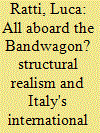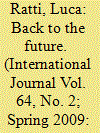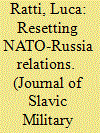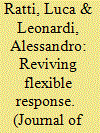|
|
|
Sort Order |
|
|
|
Items / Page
|
|
|
|
|
|
|
| Srl | Item |
| 1 |
ID:
111568


|
|
|
|
|
| Publication |
2012.
|
| Summary/Abstract |
Italy's foreign and security policy since the end of the Cold War is best accounted for by a structural realist framework rather than by liberal and constructivist accounts. More specifically, since unification and also in the post-Cold War period, the main feature of Italy's international collocation has been a dialectical interaction between a structural tendency to "bandwagon" with the hegemonic Power, which can guarantee the protection of Italian interests and forestall the risk of exclusion, and the search for regional autonomy. Italy's structural, dialectical interaction between "bandwagoning" and the search for autonomy is a response to opposite systemic incentives: Italy "bandwagons" every time the international status quo unravels or when a new order is being imposed; it endeavours to assert a more independent role in periods of international stability. During the Cold War, Italy bandwagoned with the United States, whilst European integration and a limited number of initiatives in the Mediterranean saw it attempt to preserve a degree of regional autonomy. The end of the East-West division, replacing scenarios of a nuclear attack or of conventional warfare along the East-West border with the unpleasant prospect of "entrapment" in neighbouring local crises, rekindled the tension between Italy's structural tendency to side with the hegemonic Power and its aspiration to regional autonomy.
|
|
|
|
|
|
|
|
|
|
|
|
|
|
|
|
| 2 |
ID:
090749


|
|
|
|
|
| Publication |
2009.
|
| Summary/Abstract |
This article evaluates different theoretical frameworks for understanding both the nature of the NATO alliance and evolution of NATO-Russia relations since the end of Cold War. It argues that the evolution of relations between the alliance and Moscow is best accounted for by the realist analytical perspective, while liberal and social-constructive perspectives fail to capture the most important aspects of alliance.
|
|
|
|
|
|
|
|
|
|
|
|
|
|
|
|
| 3 |
ID:
123221


|
|
|
|
|
| Publication |
2013.
|
| Summary/Abstract |
This article provides an analysis of the 'reset' policy toward Russia, which was inaugurated in 2008 by the Obama administration and soon embraced by the North Atlantic Treaty Organization (NATO). It argues that, rather than being prompted by domestic dynamics in the United States, the 'reset' was a response to systemic pressures. More specifically, the West's relative decline on the international system, the retrenchment of expeditionary NATO, and the rise of potentially revisionist powers. Although prompting an improvement in the relationship, these pressures failed to bring about Russia's full integration into the post-Cold War Western international settlement. In the immediate aftermath of the 2008 Russian-Georgian War, NATO's relations with Moscow experienced an initial revitalization through a resumption of the works of the NATO-Russia Council (NRC), the signing of a New Start Treaty between the United States and Russia in 2010, and an expansion of supply lines to Afghanistan through Russian territory. However, there was no real incentive for both sides to truly 'reset' the relationship. The alliance never treated Russia equally, preferring instead to dictate conditions. Any discussion of Russian-NATO relations was couched in this context; the 'reset' was also conceived as a small gift to Moscow. For its part, the Kremlin never accepted a junior partner status, making it clear that its preferred option remains the alliance's dissolution and the creation of a different, new pan-European organization that would incorporate the Russian Federation as a full member. The article concludes that, despite the mixed achievements of the 'reset', the alliance retains a systemic incentive to seek durable cooperation with Russia.
|
|
|
|
|
|
|
|
|
|
|
|
|
|
|
|
| 4 |
ID:
167780


|
|
|
|
|
| Summary/Abstract |
This article reviews NATO’s embrace of a new political and military strategy toward the Soviet Union in the second half of the 1960s and seeks to determine whether the tools that were singled out then in the debate over strategy could help overcome the current stalemate between the Alliance and the Russian Federation. Between 1967 and 1969, NATO adopted the Harmel Report and embraced the doctrine of ‘flexible response’ to retain relevance in a rapidly transforming international system. At 70, the dynamics faced by the Alliance place NATO at a similarly critical juncture. A rekindled strategy of 'flexible response' might help the Alliance preserve a premier role in Euro-Atlantic security and strike a durable arrangement with Moscow.
|
|
|
|
|
|
|
|
|
|
|
|
|
|
|
|
|
|
|
|
|